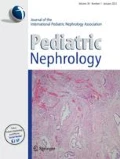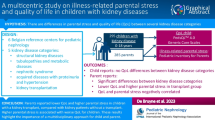Abstract
Health-related quality of life (HRQOL) in parents of children suffering from renal disease is often diminished by the illness burden experienced in daily life and by unfavorable ways of coping. Our aim was to examine the relationship between psychosocial strains perceived by parents, their ways of coping, and HRQOL. In an anonymous cross-sectional study, parents completed a questionnaire concerning psychosocial strains, coping strategies, and HRQOL, as well as sociodemographic and illness parameters. Study participants were recruited in two outpatient dialysis centers. Participating in the study were 195 parents (105 mothers, 90 fathers; age 43 ± 8 years; representing 108 families) of children suffering from renal disease (age 12 ± 5 years). Parents of children with chronic renal failure reported moderate HRQOL with parents of children undergoing dialysis experiencing more limitations in quality of life than parents of children living with a kidney graft and parents of children undergoing conservative treatment. Mothers experienced lower HRQOL and higher psychosocial strains than fathers. HRQOL was predicted by the coping strategies “focusing on child” (β = –0.25), “improving marital relationship” (β = 0.24), “seeking social support” (β = –0.22) and “self-acceptation and growth” (β =0 .19) as well as parents′ perceived limitation by illness in daily life (β = –0.15; explained variance 57%). In the comprehensive care for families with a child suffering from a renal disease, screening for psychosocial strains and ways of coping, along with applying interventions to strengthen adaptive coping strategies, may be a preventative means of improving parents′ quality of life.
Similar content being viewed by others
References
van der Heijden BJ, van Dijk PC, Verrier-Jones K, Jager KJ, Briggs JD (2004) Renal replacement therapy in children: data from 12 registries in Europe. Pediatr Nephrol 19:213–221
Lewis MA, Shaw J, Sinha M, Adalat S, Hussain F, Inward C (2009) UK renal registry 11th annual report. Nephron Clin Pract 111(suppl 1):c257–c267
Aldridge MD (2008) How do families adjust to having a child with chronic kidney failure? A systematic review. Nephrol Nurs J 35:157–162
Tong A, Lowe A, Sainsbury P, Craig JC (2008) Experiences of parents who have children with chronic kidney disease: a systematic review of qualitative studies. Pediatrics 121:349–360
Zelikovsky N, Schast AP, Jean-Francois D (2007) Parent stress and coping: waiting for a child to receive a kidney transplant. J Clin Psychol Med Settings 14:320–329
Anthony SJ, Hebert D, Todd L, Korus M, Langlois V, Pool R, Robinson LA, Williams A, Pollock-Barziv SM (2010) Child and parental perspectives of multidimensional quality of life outcomes after kidney transplantation. Pediatr Transplant 14:249–256
Young GS, Libman Mintzer L, Seacord D, Castaneda M, Mesrkhani V, Stuber ML (2003) Symptoms of posttraumatic stress disorder in parents of transplant recipients: incidence, severity, and related factors. Pediatrics 111:725–731
Farley LM, DeMaso DR, D’Angelo E, Kinnamon C, Bastardi H, Hill CE, Blume ED, Logan DE (2007) Parenting stress and parental post-traumatic stress disorder in families after pediatric heart transplantation. J Heart Lung Transplant 26:120–126
Tsai TC, Liu SI, Tsai JD, Chou LH (2006) Psychosocial effects on caregivers for children on chronic peritoneal dialysis. Kidney Int 70:1983–1987
Heaton J, Noyes J, Sloper P, Shah R (2005) Families′ experiences of caring for technology-dependent children: a temporal perspective. Health Soc Care Community 13:441–450
de Paula ES, Nascimento LC, Rocha SM (2008) Roles assessment in families of children with chronic renal failure on peritoneal dialysis. Int J Nurs Pract 14:215–220
Cimete G (2002) Stress factors and coping strategies of parents with children treated by hemodialysis: a qualitative study. J Pediatr Nurs 17:297–306
Douglas JE, Hulson B, Trompeter RS (1998) Psycho-social outcome of parents and young children after renal transplantation. Child Care Health Dev 24:73–83
Goldstein SL, Graham N, Burwinkle T, Warady B, Farrah R, Varni JW (2006) Health-related quality of life in pediatric patients with ESRD. Pediatr Nephrol 21:846–850
Chiu MC, Ng CF, Lee LP, Lai WM, Lau SC (2007) Automated peritoneal dialysis in children and adolescents-benefits: a survey of patients and parents on health-related quality of life. Perit Dial Int 27:138–142
Goldstein SL, Rosburg NM, Warady BA, Seikaly M, McDonald R, Limbers C, Varni JW (2009) Pediatric end stage renal disease health-related quality of life differs by modality: a PedsQL ESRD analysis. Pediatr Nephrol 24:1553–1560
Lai WM (2009) Quality of life in children with end-stage renal disease: does treatment modality matter? Perit Dial Int 29:190–191
Rosenkranz J, Reichwald-Klugger E, Oh J, Turzer M, Mehls O, Schaefer F (2005) Psychosocial rehabilitation and satisfaction with life in adults with childhood-onset of end-stage renal disease. Pediatr Nephrol 20:1288–1294
Ravens-Sieberer U, Morfeld M, Stein REK, Jessop DJ, Bullinger M, Thyen U (2001) Der Familien-Belastungs-Fragebogen (FaBel-Fragebogen). Testung und Validierung der deutschen Version der “Impact on family scale” bei Familien mit behinderten Kindern. Psychother Psychosom Med Psychol 51:384–393
Krause MP, Petermann F (1998) Konstruktion einer Bewältigungsskala für Eltern behinderter Kinder (Soziale Orientierungen von Eltern behinderter Kinder–SOEBEK). Kindheit und Entwicklung 7:112–120
Muthny FA (1989) FKV–Freiburger Fragebogen zur Krankheitsverarbeitung. Manual, Hogrefe Verlag, Göttingen
Goldbeck L, Storck M (2002) Das Ulmer Lebensqualitäts-Inventar für Eltern chronisch kranker Kinder (ULQIE): entwicklung und psychometrische Eigenschaften. Z Klin Psychol Psychother 31:31–39
Goldbeck L (2006) The impact of newly diagnosed chronic paediatric conditions on parental quality of life. Qual Life Res 15:1121–1131
Frei U, Schober-Halstenberg HJ (2008) Nierenersatztherapie in Deutschland. QuaSi Niere gGmbH, Berlin
Wiedebusch S, Muthny FA (2009) Eltern von chronisch kranken Kindern. Lebensqualität, psychosoziale Belastungen und Bedürfnisse. Monatsschr Kinderheilkd 157:903–910
Burke ML, Eakes GG, Hainsworth MA (1999) Milestones of chronic sorrow: perspectives of chronically ill and bereaved persons and family caregivers. J Fam Nurs 5:374–387
Roos S (2002) Chronic sorrow: a living loss. Brunner-Routledge, New York
Simons L, Ingerski LM, Janicke DM (2007) Social support, coping, and psychological distress in mothers and fathers of pediatric transplant candidates: a pilot study. Pediatr Transplant 11:781–787
Bottos AM, Zanon E, Sartori MT, Girolami A (2007) Psychological aspects and coping styles of parents with heamophilic child undergoing a programme of counselling and psychological support. Haemophilia 13:305–310
Friedman AL (2006) The broader burden of end-stage renal disease on children and their families. Kidney Int 70:1893–1894
Author information
Authors and Affiliations
Corresponding author
Rights and permissions
About this article
Cite this article
Wiedebusch, S., Konrad, M., Foppe, H. et al. Health-related quality of life, psychosocial strains, and coping in parents of children with chronic renal failure. Pediatr Nephrol 25, 1477–1485 (2010). https://doi.org/10.1007/s00467-010-1540-z
Received:
Revised:
Accepted:
Published:
Issue Date:
DOI: https://doi.org/10.1007/s00467-010-1540-z




